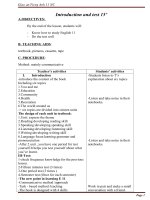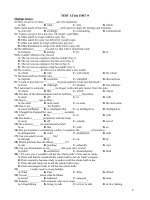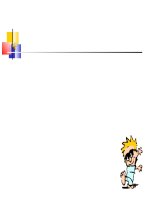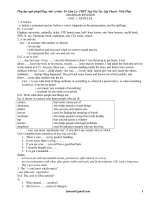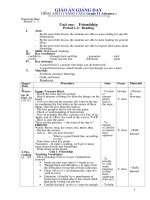English 11
Bạn đang xem bản rút gọn của tài liệu. Xem và tải ngay bản đầy đủ của tài liệu tại đây (143.39 KB, 8 trang )
<span class='text_page_counter'>(1)</span>Theory of Tenses 1. Câu điều kiện loại 1: điều kiện có thể xảy ra trong tương lai If + S + am / is / are, S + will / shall / can / may + be If + S + V / V-s / V-es, S + will / shall / can / may + Vo Hoặc: If + S + [{am / is / are} / {V/ V-s /V-es}], S + {will / shall / can / may} + {be / Vo} Ngoài ra ta còn dùng unless thay vì dùng if trong câu phủ định. Khi câu điều kiện chắc chắn xảy ra, lúc ấy ta dùng when chứ không dùng if. *. Chú ý: I + am; He / She / It + is You / We / They + are I / You / We / They + V He / She / It + {V-s / V-es} will / can / may: dùng cho tất cả các ngôi; trong khi shall thì dùng cho I & We. a. If it is hot tomorrow, we will go swimming. b. He will fail the exams unless he tries hard. c. I will go fishing when summer comes. 2. Câu điều kiện loại 2: điều kiện trái với sự thật trong hiện tại / điều kiện giả định trong hiện tại If + S + were, S + would / should / could / might + be If + S + V2/-ed, S + would / should / could / might + Vo Hoặc: If + S + [{were} / {V2/-ed}], S + [{would / should / could / might} + {be / Vo}]. *. Chú ý: (be) được chia thành were cho tất cả các ngôi trong trường hợp này; hay nói cách khác was hiếm khi được dùng trong câu điều kiện loại 2. a. If I were you, I would not do that. b. If you exercised more, you would feel better. c. If the earth stopped moving around the sun, everyone would die. 3. Câu điều kiện loại 3: điều kiện trái với sự thật trong quá khứ / điều kiện giả định trong quá khứ If + S + had + been, S + would / should / could / might + have + been If + S + had + V3/-ed, S + would / should / could / might + have + V3/-ed Hoặc: If + S + [{had}/ {been / V3/-ed}], S + [{would / should / could / might} + {have + V3/-ed}]. a. If you hadn’t been late for school yesterday, the teacher wouldn’t have punished you. b. If we hadn’t gone by coach, we wouldn’t have got carsick. 4. Cấu trúc wish trong hiện tại: ước sự việc ngược với hiện tại S + [wish / wishes] (that) + S + [{were / V2/-ed}]. a. I wish I were a billionaire. b. He wishes he didn’t have to go to school today. 5. Cấu trúc wish trong tương lai: ước sự việc ngược với tương lai: S + [wish / wishes] (that) + S + [{would / could / should / might} + {be / Vo}]. a. I wish it would be hot tomorrow. b. He wishes that his girl friend could visit him next weekend. 6. Thì hiện tại đơn: S + (be) → S + am / is / are S + (V) → S + V / V-s / V-es Lưu ý: *. I + am {He / She / It} + is {You / We / They} + are *. {I / You / We / They} + V {He / She / It} + V-s / V-es *. Khi He / She / It đi với các động từ có các chữ cái tận cùng: -CH, -SH, -S, -X, -Z thì dùng V-es. Ví dụ: catch – catches / wash – washes / focus – focuses / fix – fixes / buzz – buzzes *. Khi He / She / It đi với động từ có dạng phụ âm + y thì biến đổi y thành i rồi +es Ví dụ: cry – cries / fly – flies / try – tries *. Đôi khi He / She / It đi với một số động từ tận cùng bằng phụ âm + o thì cũng có động từ thêm es Ví dụ: do – does / go / goes / overdo – overdoes / undergo – undergoes ….
<span class='text_page_counter'>(2)</span> Diễn tả sự vật, hiện tượng, chân lý, tên, tuổi, thói quen, nghề nghiệp trong hiện tại. Được dùng trong mệnh đề if của câu điều kiện loại 1. Thường được dùng với các trạng từ năng diễn như: always / usually / often / sometimes / occasionally / seldom / ever / never … a. My name is John. I come from the USA. b. If it is hot tomorrow, I will go swimming. c. Babies always cry. 7. Thì hiện tại tiếp diễn: S + {am / is / are} + V-ing. Dùng để diễn tả sự việc hay hành động đang xảy ra ngay lúc nói. Thường được dùng với các trạng từ như: now / right now / at the moment, today, this week … / trong cấu trức It’s [time] now. S + hiện tại tiếp diễn. Trả lời cho câu hỏi where. Ví dụ: Where is John? – He is sleeping in his room. a. We are studying English now. b. I am reading an interesting novel at the moment. c. It is 7.30 now. We are working. d. Where is John? – He is having a bath. *. Chú ý: Không dùng các thì tiếp diễn với một số động từ chỉ trạng thái và đồng từ chỉ điều kiện: + Descriptions (miêu tả): be / resemble (giống với) = / look like / look (trông) / seem / appear / sound / sound like / include / involve / consist of / contain / lack + Possession and Relationships (sở hữu và mối quan hệ): have / possess / own / belong to / owe / depend on + Measurements (đo lường): weigh / measure / equal / cost + Senses and Physical Sensations (giác quan và cảm giác): feel / hear / see / taste / smell / hurt / ache / tingle = / itch (ngứa) + Emotions and Attitudes (Tình cảm và thái độ): love / like / care of / adore (yêu) / appreciate / value / hate / dislike / mind / want / need / prefer / wish + Ideas (Ý kiến): know / think / believe / recognize / remember / understand / mean 8. Thì hiện tại hoàn thành: S + [{have / has} + [V3/-ed]]. *. Chú ý: I / You / We / They + have He / She / It + has Dùng để diễn tả hành động hay sự việc đã xảy ra trong quá khứ nhưng còn có thể kéo dài đến thời điểm hiện tại và có thể còn trong tương lai. Thường được dùng với các trạng từ như: ever / never / just / yet / already / lately / so far / up to now / for + khoảng thời gian / since + mốc thời gian … a. So far we have studied four lessons. b. I have just met a beautiful girl. c. They haven’t met again for a long time. d. She has been here since yesterday. e. It is the first time I have met her. 9. Thì hiện tại hoàn thành tiếp diễn: S + [{have / has} + {been + V-ing}]. Giống như thì hiện tại hoàn thành nhưng nó kéo dài trong một khoảng thời gian và còn kéo dài trong thời điểm trong hiện tại và trong tương lai. Thì này chỉ dùng trong kì thi học sinh giỏi và thi Đại học. a. Hurry up! I have been waiting for you for about half an hour. b. I have been studying English for more than four years. *. Chú ý: Không dùng động từ chỉ trạng thái và điều kiện ở thì này. 10. Thì quá khứ đơn: S + (be) S + (V) *. Chú ý:. → →. S + was / were S + V2 / V-ed.
<span class='text_page_counter'>(3)</span> I / He / She / It → was You / We / They → were V2/-ed → đi với tất cả các ngôi Học thuộc bảng động từ bất qui tắc. Dùng để nói đến sự việc hay hành động đã xảy ra và đã chấm dứt trong quá khứ. Thường được dùng với các trạng từ sau: yesterday / last {night / week / month / year} / {two minutes / three days / four weeks / five months / several years} ago / in + năm ≤2012, trong mệnh đề if của câu điều kiện loại 2 / trong cấu trúc wish – ước sự thật trái với hiện tại / since + S + V2/-ed / và còn nhiều cấu trúc khác nữa. a. Shakespeare wrote Hamlet. b. What did you do yesterday? – I did my homework. c. I was here ten minutes ago. d. We traveled to London in 2010. e. Last week I visited my grandparents. f. If I were you, I would not do that. g. He has drunk a lot since his wife left him. 11. Thì quá khứ tiếp diễn: S + {was / were} + V-ing Dùng để diễn tả hành động đang xảy ra trong quá khứ. Thường dùng với các cụm trạng từ sau: at this time yesterday / at 3 o’clock last Sunday / from 3pm to 5pm yesterday / all yesterday afternoon / … Với cấu trúc: - While / As + S + was / were + V-ing, S + was / were + V-ing - While / As + S + was / were + V-ing, S + V2/-ed. - When + S + was / were + V-ing, S + V2/-ed. - S + was / were + V-ing + when + S + V2/-ed. a. I was doing my homework at 3 p.m. yesterday. b. We were playing chess all yesterday afternoon. c. The light went out while we were studying. d. Mary was studying while her brother was playing computer games. *. Chú ý: Không dùng các động từ chỉ trạng thái và điều kiện ở thì này. 12. Thì quá khứ hoàn thành: S + had + V3/-ed. S + had + V3/-ed + before / by the time / when + Before / When / By the time + S + V2/ed, S + had After + S + had + V3/-ed, S + V2/-ed. a. When we came, she had died. b. By the time we got her letter, she had arrived in Paris. c. After I had had breakfast, I went to school.. S +. + V2/-ed. V3/-ed.. 13. Thì quá khứ hoàn thành tiếp diễn: S + had + been + V-ing + for + (the amount of time). Dấu hiệu của thì quá khứ hoàn thành + khoảng thời gian (for ten minutes / for two hours …) - Thì này ít được dùng, chỉ cho thi học sinh giỏi, Cao đẳng và Đại học. I had been waiting for you for an hour before you came here. *. Chú ý: Không dùng các động từ chỉ trạng thái và điều kiện ở thì này. 14. Thì tương lai đơn: S + will + Vo. (Ngoài ra ta có thể dùng shall / can / may thay vì dùng will) - Diễn tả sự việc hay hành động sẽ xảy ra trong tương lai. - Những cụm từ thường dùng trong thì tương lai đơn: tomorrow / next {week / month / year} / in + năm ≥ 2012 / in {two weeks / three months} / … - Xuất hiện trong mệnh đề chính của câu điều kiện loại 1. a. I will be sixteen on my next birthday. b. I will travel to China in 2020..
<span class='text_page_counter'>(4)</span> c. You will retake the exams in about one week. d. If it is fine tomorrow, I will go fishing. 15. Thì tương lai tiếp diễn: Công thức: S + will + be + V-ing. - Diễn tả hành động đang xảy ra trong tương lai. - at + time + dấu hiệu trong tương lai. a. I will be doing my homework at 3 p.m. tomorrow. b. We will be meeting our relatives at the airport all tomorrow morning. Chú ý: Dấu hiệu tiếp diễn + dấu hiệu tương lai Không dùng các động từ chỉ trạng thái và điều kiện ở thì này. 16. Thì tương lai hoàn thành: Công thức: S + will + have + V3/-ed. - Diễn tả hành động sẽ xảy ra và hoàn thành trong tương lai. - Những cụm từ và cấu trúc thường dùng: - By + {next Sunday / next week / next month / next year / the time} / + S + hiện tại đơn a. I will have finished my homework by next Sunday. b. We will have prepared everything by the time all the guests come tomorrow. Chú ý: Dấu hiệu hoàn thành + dấu hiệu tương lai. 17. Thì tương lai hoàn thành tiếp diễn: Công thức: S + will + have + been + V-ing - Diễn tả hành đồng sẽ xảy ra và còn kéo dài trong tương lai. - Dấu hiệu thường dùng cũng giống nhưng các thì hoàn thành tiếp diễn khác + dấu hiệu trong tương lai. - Thì này ít được dùng, dạng dành cho học sinh giỏi và thi Đại học. We will have been studying English for two hours by 2 p.m. tomorrow. Chú ý: Dấu hiệu tiếp diễn + dấu hiệu hoàn thành + dấu hiệu tương lai. Không dùng các động từ chỉ trạng thái và điều kiện ở thì này..
<span class='text_page_counter'>(5)</span> EXERCISES I. Use the Present Simple Tense: 1. I (go) ______________ to school six days a week. 2. She (study) ______________ English every day. 3. The sun (rise) ______________ in the east and (set) ______________ in the west. 4. This (be) ______________ a nice picture and that (be) ______________ a nice picture, too. 5. This house (be) ______________ big, but that school (be) ______________ small. 6. Hello! My name (be) ______________ Tom. I (come) ______________ from the USA. 7. These students (be) ______________ hard-working, but those (be) ______________ lazy. 8. There (be) ______________ twelve months in a year. 9. Babies always (cry) ______________. 10. The moon (move) _____________ around the earth and the earth (go) _____________ around the sun. II. Use the Present Progressive Tense: 1. Listen! Someone (sing) ______________ in the next room. 2. Be careful! A car (come) ______________. 3. Look! The boys (fight) ______________. 4. Be quiet! The baby (sleep) ______________. 5. It is 6.30 p.m. now. We (study) ______________ English. 6. Where is your mother? – She (cook) ______________ in the kitchen. 7. I (read) ______________ an interesting novel at the moment. 8. My parents (watch) ______________ TV right now. 9. It (rain) ______________ outside now. 10. She (speak) ______________ English to a foreigner at present. III. Present Simple or Present Progressive? 1. We seldom (eat) ____________ before breakfast. 2. Look! A man (run) ____________ after the train. He (want) ____________ to catch it. 3. The sun (rise) ____________ in the east and (set) ____________ in the west. 4. It (be) ____________ 7 p.m. now. We (study) ____________ English. 5. Where (be) ____________ your sister? – She (sleep) ____________ in her room. 6. I (read) ____________ an interesting book at the moment. 7. Linda always (make) ____________ clothes for herself. Right now she (make) ____________ a skirt. 8. I (do) ____________ an exercise on the present tenses at the moment and I (think) ____________ that I (know) ____________ how to use it. 9. My father usually (read) ____________ newspapers in his free time. 10. Vegetarians (not eat) ____________ meat. 11. Hurry up! The bus (come) ____________. I (not want) ____________ to miss it. 12. Listen! Somebody (sing) ____________ in the next room. 13. How often ____________ you (read) ____________ a newspaper? 14. Tom always (cycle) ____________ to school, but today he (go) ____________ on foot. 15. I (hear) ____________ you: I (know) ____________ what you (say) ____________. 16. The concert (start) ____________ at 7.30 this evening. 17. Ann, we (go) ____________ to town. ____________ you (come) ____________ with us? 18. Jane (have) ____________ coffee for breakfast every morning. 19. I (see) ____________ that you (wear) ____________ your best clothes today. 20. She sometimes (buy) ____________ vegetables at this supermarket. IV. Use the Present Perfect Tense: 1. David (just get) ___________________ up, but he (not brush) ___________________ his teeth yet. 2. It is the first time I (eat) ___________________ such a delicious cake. 3. I (never try) ___________________ french-fries before. 4. Mary (be) _____________ absent from class for three days now because she (be) _____________ ill. 5. So far we (learn) ___________________ five lessons in this book. 6. ___________________ you ever (kiss) ___________________ anyone you love? 7. I (already buy) ___________________ the book and I am reading it tomorrow..
<span class='text_page_counter'>(6)</span> 8. We (not meet) ___________________ again for a long time. 9. This boy is starving. He (not eat) ___________________ anything since yesterday. 10. It is the most interesting film I (ever see) ___________________. V. 1. 2. 3. 4. 5. 6. 7.. Use the Past Simple Tense: I (stay) ________________ home yesterday, but I (not do) ________________ my homework. Ann (be) ________________ absent from class last Friday because she (be) ________________ ill. I (start) ________________ school in 1994. My mother (read) ________________ this book several times last year. Mozart (begin) ________________ to compose music when he (be) ______________ at the age of four. Tom (use) ________________ to cry when he (be) ________________ a child. Last night, John (get) ________________ home from work at 9 p.m. He (take) ________________ a shower and then (go) ________________ to bed. 8. Yesterday when the teacher (come) _______________ into the classroom, all the students in my class (stand) _______________ up and (greet) ________________ him. 9. I (leave) ________________ home two weeks ago and (return) ________________ home yesterday. 10. Christopher Columbus (discover) ________________ America in 1492. VI. Present Perfect or Past Simple? 1. Ann and I (be) _____________ friends for a long time but I (never meet) _______________ her parents. 2. I first (meet) ____________ Jane at the park and we (be) ____________ friends since then. 3. Since his wife (die)____________ , he (be) ____________ in misery. 4. What ________________ you (do) ________________ yesterday? 5. Mary (play) ____________ the piano since she (be) ____________ six years old. 6. I (learn) ____________ English since I (be) ____________ in grade six. 7. Since Mr. Green (graduate) ______________ from the university in 1999, he (teach) __________ English at this school since then. 8. My girlfriend (be) ____________ born in 1980. 9. The teacher (give) ____________ us this exercise yesterday, but we (not finish) ____________ it yet. 10. Neither doctors nor scientists (find) ____________ out a cure for rabies up to now. 11. We (study) ____________ a very hard lesson the day before yesterday. 12. I (read) ____________ the novel written by Hemingway several times before. 13. So far we (study) ____________ almost every lesson in this book. 14. My wife and I (travel) ____________ to France by air last week. 15. I (have) ____________ a little trouble with my car some days ago. 16. How long ____________ you (learn) ____________ English? 17. Tom (never be) ____________ in Hanoi. 18. The plane (stop) ____________ at a small town. It then (take) ____________ off immediately after refueling. 19. She (be) ____________ so happy when she (hear) ____________ the news that she (cry) ____________. 20. Someone (just steal) ______________ Ann’s bicycle; therefore, she has to go to school on foot. VII. The Past Simple or the Past Progressive? 1. Yesterday when I (visit) ____________ Mr. Brown, he (work) _______________ in his garden. 2. Everyone (have) _______________ a good time when it (start) _______________ to rain. 3. The lights (go) _______________ out while I (do) _______________ my homework. 4. They (practice) _______________ English at this time yesterday. 5. What _______________ you (do) _______________ from 3 p.m. to 6 p.m. yesterday? 6. As we (cross) _______________ the street, the policeman (shout) _______________ at us. 7. Yesterday, I (cook) _______________ while my sister (wash) _______________ the dishes. 8. Bill (have) _______________ breakfast when I (stop) _______________ at his house this morning. 9. The bell (ring) _______________ while Bill (have) _______________ a bath. 10. I (be) _______________ very tired because I (work) _______________ all yesterday morning. 11. When I (arrive) ____________ at his house, he (still sleep) ____________. 12. She (water) ____________ the flowers in her garden while her next door neighbor (chat) ____________ with her over the fence..
<span class='text_page_counter'>(7)</span> 13. The children (play) ____________ soccer when their mother (come) ____________ back. 14. We (wait) ____________ for the bus when he (pass) ____________ by his car and (offer) ____________ us a lift. 15. When the students (hear) ____________ the bell, they (get) ____________ up and (leave) ____________. 16. Yesterday we (not go) ____________ out because it (rain) ____________ heavily. 17. What ____________ you (do) ____________ at this time yesterday? 18. Yesterday (be) ____________ a beautiful day. The sun (shine) ____________ and the birds (sing) ____________ beautifully. The Browns (work) ____________ in the garden when I (visit) ____________ them. I (say) ____________ hello to them. 19. I (travel) ____________ to London several times in the past. 20. A: What ____________ you (do) ____________ when the house (be) __________ on fire yesterday? B: Well, I (sleep) ____________ then. VIII. The Past Simple or the Past Perfect? 1. They (go) _______________ home after they (finish) _______________ their homework. 2. She said that she (already see) _______________ Dr. Pike. 3. When we (come) _______________ to the stadium, the match (already begin) _______________. 4. They told me that they (not eat) _______________ such kind of food before. 5. After they (go) _______________, I (sit) _______________ down and (rest) _______________. 6. Before she (watch) _______________ TV, she (do) _______________ her homework. 7. After she (take) _______________ a bath, she (go) _______________ to bed. 8. When the police (arrive) _______________, the car (already go) _______________. 9. She (just leave) _______________ the house by the time we (come) _______________. 10. He (forget) ____________ what I (tell) ____________ him before. 11. He (ask) ____________ me if I (see) ____________ his pen on the table. I (tell) ____________ him that I (not see) ____________ it around. 12. If I (wait) ____________ a little while longer, I would have met her. I (not see) ____________ her since we last (meet) ____________ three years ago. 13. It was the first time I (ever seen) ____________ such a beautiful girl. 14. He (teach) ____________ in this school before he (leave) ____________ for London. 15. Yesterday our teacher (tell) ____________ us that he (visit) ____________ England in 1970. IX. Present Simple or Future Simple? 1. We (go) _______________ out when the rain (stop) _______________. 2. I (stay) _______________ here until he (answer) _______________ me. 3. Wait here until I (catch) _______________ you. 4. If it (be) _______________ fine tomorrow, I (go) _______________ swimming. 5. When summer (come) _______________, we (go) _______________ fishing. 6. She (not come) _______________ until you (be) _______________ ready. 7. Mr. Pike (help) _______________ you as soon as he (finish) _______________ that letter tomorrow. 8. If I (pass) _______________ the exams, my parents (be) _______________ very happy. 9. I (send) _______________ you some postcards as soon as I (arrive) _______________ in London. 10. Liz (be) _______________ seventeen on her next birthday. 11. I (wait) ____________ here until he (finish) ____________ his novel. 12. After the class (be) ____________ over, ask the teacher about that sentence. 13. I (come and see) ____________ you before I (leave) ____________ here. 14. Don’t come until I (finish) ____________ lunch. 15. I hope the weather (be) ____________ fine tomorrow. X. Use the correct verb tenses: 1. According to the timetable, if the train leaves on time, we (arrive) __________________ at 5.30. 2. I cannot go out without a raincoat right now because it (rain) __________________ heavily. 3. So far we (study) __________________ ten lessons. 4. The lights (go) __________________ out while I (do) __________________ my homework yesterday. 5. Look! The children (fight) __________________..
<span class='text_page_counter'>(8)</span> 6. If I (be) __________________ free tomorrow, I (visit) __________________ you. 7. You (not pass) __________________ the exam unless you work harder. 8. I (read) __________________ an interesting novel at the moment. 9. Liz gave me this ring. She (be) _______________ upset if I lost it. 10. Would Tim mind if I (borrow) _______________ his bicycle without asking him? 11. My father (watch) _______________ TV every night. 12. My wife (thank) _______________ me for what I (do) _______________ for her last night. 13. Someone (steal) _______________ Tom’s bicycle; therefore, he has to go to school on foot. 14. Mary (play) _______________ the piano since she (be) _______________ five. 15. We (not meet) _______________ again since we (leave) _______________ school. 16. The man (drink) _______________ every day since his wife (die) _______________. 17. People (speak) _______________ English all over the world. 18. It is 4 p.m. now. I (study) _______________ English. 19. By the time the police (arrive) _______________, the car (already go) _______________. 20. She (be) _______________ in Paris by the time we (come) _______________. 21. I (be) ____________ busy at the moment. I (redecorate) ____________ the sitting room. 22. I always (buy) ____________ lottery tickets, but I never (win) ____________ anything. 23. At this time next month I (sit) ____________ on a beach. 24. I am sure that I (recognize) ____________ him. 25. He (lose) ____________ his job last month and since then he (be) ____________ out of work. 26. I (see) ____________ a car accident while I (wait) ____________ for you on this corner yesterday. 27. Mr. Jones (be) ____________ the principal of our school since last year. 28. We (not live) ____________ in England for two years now. 29. I (never forget) ____________ what you (just tell) ____________ me. 30. So far George (work) ____________ at the university. 31. I (lose) ____________my key. Can you help me look for it? 32. The teacher wasn’t at home when we (arrive) ____________. He (just go) ____________ out. 33. I (not see) __________ Mrs. Baker for a long time. I can’t remember when I last (see) __________ her. 34. When the teacher (came) ____________ in, the students (play) ____________ games. 35. Yesterday the police (report) ____________ that they (capture) ____________ two thieves. 36. Last month I (be) ____________ in hospital for ten days. 37. By next month, I (finish) ____________ my first novel. 38. John (drive) ____________ that car ever since I (know) ____________ him. 39. People (speak) ____________ English in most of Canada. 40. What ____________ you (do) ____________ when I (ring) ____________ you last night? 41. Up to now I (never see) ____________ such a fat man. 42. Kate and I (wait) ____________ right here until you (get) ____________ back. 43. Why ____________ you (not listen) ____________ while I (speak) ____________ to you? 44. Someone (just cut) ____________ down all the trees in this garden. 45. By the end of last month, I (study) ____________ English for five years. 46. By the end of next month, I (teach) ____________ English for more than thirteen years. 47. What ____________ you (do) ____________ after you (go) ____________ home yesterday? 48. How long ____________ you (wait) ____________ for me? – Just a few minutes..
<span class='text_page_counter'>(9)</span>

